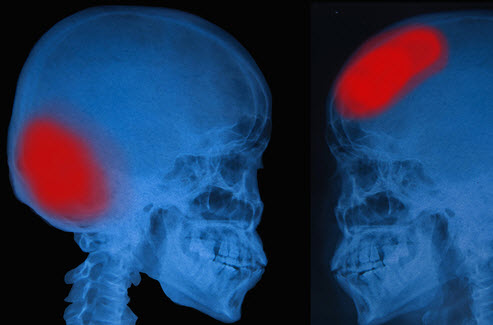Car accidents can have a brutal effect on your entire body. When asked what was a safe speed at which to collide with another vehicle, a scientist once responded, “I’m not sure, at what speed would you feel comfortable running into a wall?” The force is no different. In fact, in many cases it is multiplied if the other car is moving as well. The inertia that takes place when your car is forced to suddenly come to a stop causes a whiplash type motion. It’s not just your body that jolts forward against your seatbelt. Your brain also rushes forward only to crash into your skull. This can result in what is known as a traumatic brain injury (TBI). This is somewhat of an umbrella term to encompass many different types of specific harm that can result when your normal brain function is disrupted. Generally this disruption occurs due to sudden force, violent shaking, or a penetrative wound to the skull. A car accident, you’ll notice, has the potential to cause all of these.
How Do I Know If I Have a TBI?
If you have been in a car accident, regardless of your perceived severity of the collision, you really cannot know whether you have a traumatic brain injury. There are certainly signs and symptoms that you should watch for, but keep in mind that you may be observing, analyzing, and judging these symptoms with a brain that is swollen, bleeding, or severely damaged, which can dramatically affect your cognitive abilities. For this reason, we tell all of our clients to make it a default rule that if they are ever in a car accident (or suffer any kind of head wound, for that matter) that they have it assessed by a medical professional as soon as possible. It is not a wait-and-see situation, as waiting even a short time could have potentially fatal consequences.
Signs and Symptoms of a TBI
Common symptoms of a traumatic brain injury include dizziness or lightheadedness, confusion, amnesia or inability to remember the accident, disruptions to memory, an inability to concentrate, nausea, vomiting, slurred speech, and blurred vision or other visual distortions. These are the immediate symptoms. Often, in the aftermath of a car accident, it is easy to write one or even a few of these off as relating to nerves, overwhelm, or just “being shaken up,” but it’s important to seek medical attention because the long-term consequences of an untreated TBI can be very serious, even causing mood disorders and changes to one’s personality.
Talk to the O’Donnell Law Offices
If you have suffered serious or even life-altering consequences due to a TBI caused by an accident that was not your fault, our experienced personal injury lawyers want to help you. Schedule a free initial consultation with the personal injury attorneys at the O’Donnell Law Offices serving clients in Kingston, Wilkes Barre, Hazleton and Pittston at 570-821-5717 or online today. There is no fee or costs until we win your case.

